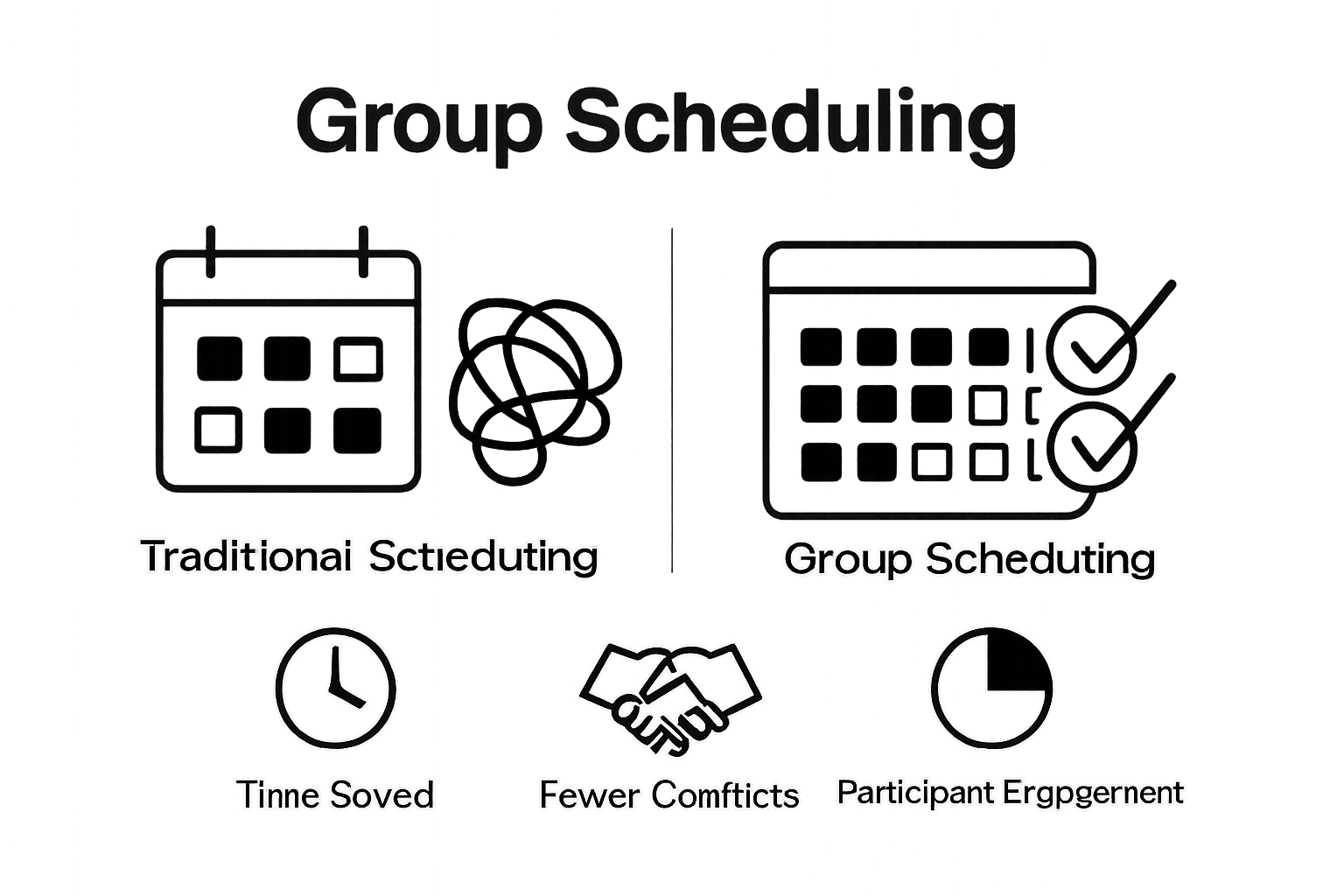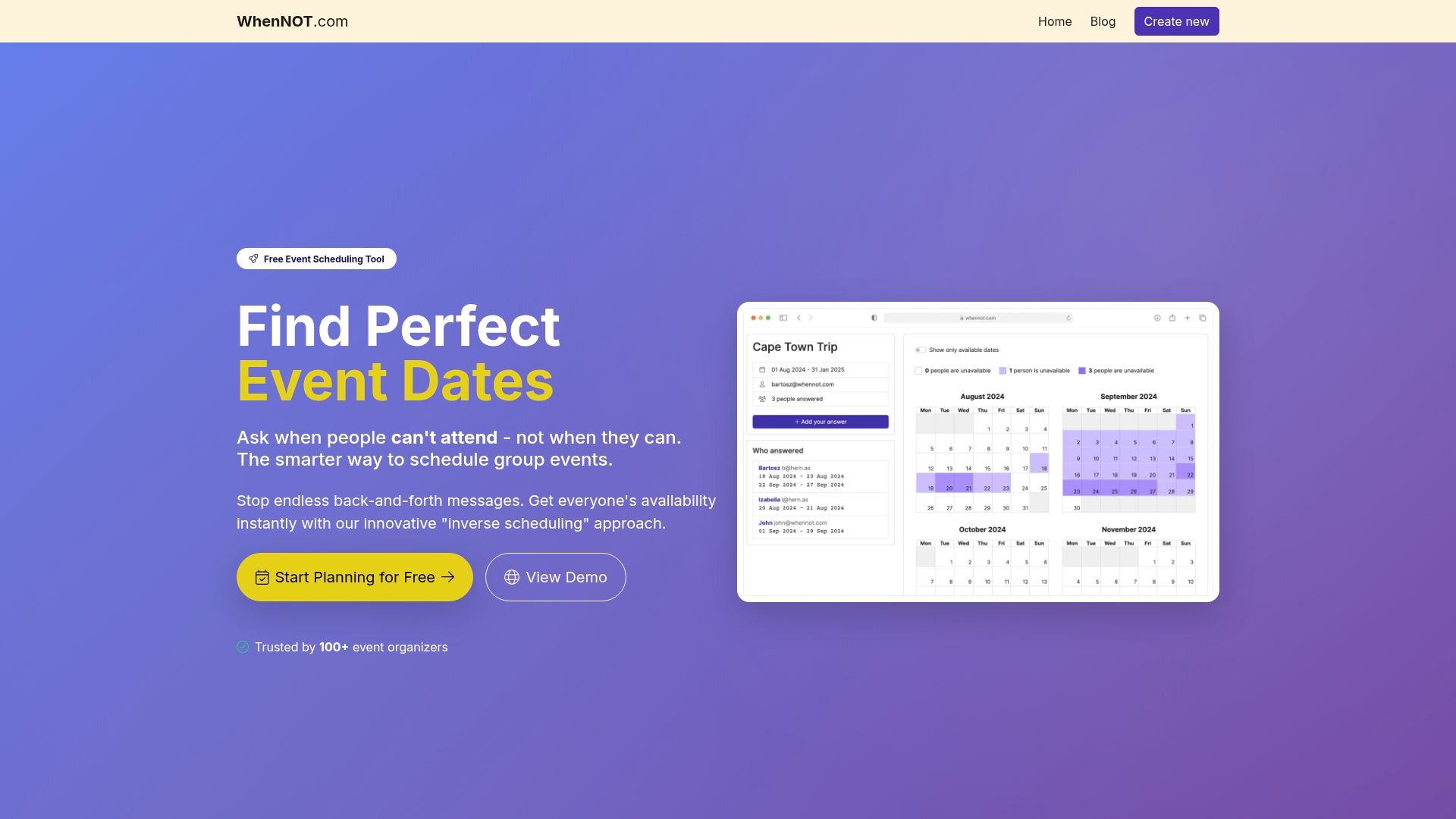Trying to get everyone in a group to agree on a meeting time can feel like herding cats. Still, it turns out all that endless email ping-pong really adds up. Traditional scheduling methods eat up hours of admin time, with one study showing an average team wastes more than 10 hours a month coordinating calendars. You might expect technology to replace the human touch or make things even more complicated, but smart group scheduling tools actually bring teams closer together by making time coordination smooth, fast, and unexpectedly stress-free.
Table of Contents
- What Is Group Scheduling And Its Purpose?
- The Importance Of Collaboration In Scheduling
- Benefits Of Efficient Group Scheduling
- How Group Scheduling Tools Enhance Coordination
- Real-World Examples Of Successful Group Scheduling
Quick Summary
| Takeaway | Explanation |
|---|---|
| Streamline scheduling processes using technology | Group scheduling tools significantly reduce the time spent coordinating multiple schedules through automation and real-time updates. |
| Enhance collaboration with inclusive processes | Collaborative scheduling considers individual preferences, fostering team cohesion and increasing participation motivation. |
| Minimize scheduling conflicts efficiently | Effective group scheduling dramatically lowers the likelihood of overlapping commitments, promoting better time management and resource focus. |
| Improve organizational productivity through scheduling | Organizations that implement beneficial scheduling practices often see enhanced communication and quicker decision-making processes. |
| Leverage data insights for strategic advantages | Advanced scheduling tools provide valuable organizational insights that can optimize resource allocation and team dynamics. |
What is Group Scheduling and Its Purpose?
Group scheduling represents a strategic approach to coordinating events, meetings, and gatherings involving multiple participants. At its core, group scheduling solves the complex challenge of finding mutually convenient time slots when numerous individuals must synchronize their availability.
Understanding the Core Concept
Group scheduling transforms the traditional method of manual calendar coordination by providing a systematic way to identify shared open time windows. Research from the Association for Computing Machinery reveals that traditional scheduling methods consume significant administrative time, often requiring extensive back-and-forth communications.
The primary objectives of group scheduling include:
- Minimizing communication overhead
- Reducing scheduling conflicts
- Simplifying complex coordination processes
- Enabling efficient time management across diverse groups
Why Group Scheduling Matters
In professional and personal contexts, coordinating schedules can become extraordinarily challenging. Whether organizing a business meeting, planning a family reunion, or arranging a community event, traditional scheduling methods often lead to frustration and inefficiency.
Group scheduling tools address these challenges by providing collaborative platforms where participants can transparently share their availability. These solutions leverage technology to streamline the coordination process, eliminating endless email chains and telephone tag.
Practical Applications
Group scheduling finds relevance across multiple domains. Corporate teams use these tools for project planning, remote workgroups coordinate international meetings, academic institutions schedule complex class rotations, and social groups plan gatherings with unprecedented ease.
The fundamental value proposition is clear: transforming a potentially complex negotiation of time into a straightforward, user-friendly experience that respects everyone's individual constraints and commitments.
The Importance of Collaboration in Scheduling
Collaboration in scheduling transforms group coordination from a potentially frustrating process into an inclusive, efficient strategy that respects individual needs and collective objectives. This approach goes beyond simply finding a mutually convenient time slot.
Psychological and Practical Benefits
Research from the National Institutes of Health demonstrates that collaborative scheduling significantly enhances group dynamics and participant engagement. When individuals feel their time constraints and preferences are genuinely considered, they experience:
- Increased motivation to participate
- Greater sense of team cohesion
- Reduced scheduling stress
- Improved overall communication
Addressing Complex Group Dynamics
Collaborative scheduling acknowledges that each participant brings unique time constraints, responsibilities, and personal commitments. This approach recognizes that scheduling is not merely a logistical exercise but a nuanced negotiation of individual availability and group priorities.
By creating a transparent, inclusive process, teams can navigate scheduling challenges more effectively.
This method allows participants to proactively communicate limitations, preferences, and potential conflicts, transforming scheduling from a potential source of friction into an opportunity for mutual understanding.
Strategic Organizational Value
Beyond immediate scheduling convenience, collaborative scheduling offers strategic advantages for organizations. Teams that develop robust, respectful scheduling practices often experience improved communication, increased trust, and enhanced overall productivity.
The collaborative approach signals a fundamental organizational respect for individual time management. It demonstrates that the group values each member's professional and personal commitments, creating a more supportive and adaptive work environment.
Benefits of Efficient Group Scheduling
Efficient group scheduling transcends basic time coordination, offering transformative advantages that impact organizational productivity, team dynamics, and individual performance. By streamlining the complex process of aligning multiple schedules, groups can unlock significant potential across various domains.
Productivity and Time Management
Research from Strategic Management Journal reveals that organizations implementing sophisticated scheduling processes experience substantial improvements in project delivery and resource allocation. Efficient group scheduling delivers critical benefits such as:
- Minimizing time wasted on coordination efforts
- Reducing scheduling conflicts
- Enabling precise resource planning
- Accelerating decision making processes
Enhanced Communication and Collaboration
Beyond pure logistical advantages, efficient group scheduling fundamentally transforms team interactions. When scheduling becomes seamless, teams can focus more energy on substantive work rather than administrative negotiations. This approach creates an environment where communication flows naturally, barriers dissolve, and collaborative potential increases.
Participants experience a sense of mutual respect and understanding, knowing their individual constraints are being considered while maintaining collective objectives. The scheduling process itself becomes a mechanism for building trust and strengthening interpersonal relationships.
Strategic Organizational Advantages
Efficient group scheduling represents more than a tactical tool it is a strategic organizational capability. Companies that master scheduling demonstrate adaptability, respect for individual time management, and a commitment to creating flexible work environments.
By reducing friction in coordinating activities, organizations can respond more quickly to emerging opportunities, allocate resources more intelligently, and maintain a competitive edge in rapidly changing business landscapes. The ability to efficiently synchronize diverse schedules becomes a subtle yet powerful differentiator in high-performance teams.

How Group Scheduling Tools Enhance Coordination
Group scheduling tools represent a technological solution to the complex challenge of synchronizing multiple participants schedules. These digital platforms transform traditional coordination methods by providing intelligent, user friendly mechanisms for finding optimal meeting times and managing group availability.
Key Technological Features
Research from ACM Digital Library highlights how advanced scheduling technologies integrate seamlessly with existing communication infrastructures. Modern group scheduling tools offer sophisticated features that go beyond simple calendar matching, including:
- Automated availability detection
- Real time schedule synchronization
- Conflict resolution algorithms
- Cross platform compatibility
Intelligent Coordination Mechanisms
Group scheduling tools leverage complex algorithms to analyze individual schedules and identify potential common time windows. These systems consider numerous variables such as time zones, personal preferences, recurring commitments, and participant priority levels. By processing this information simultaneously, they dramatically reduce the cognitive load associated with manual scheduling.
The underlying technology transforms scheduling from a negotiation process into an automated, transparent experience. Participants can view potential meeting slots, indicate their preferences, and receive instant recommendations without extensive back and forth communications.
Strategic Organizational Benefits
Beyond immediate scheduling convenience, these tools offer strategic advantages for organizations. They provide data insights into team availability, help optimize resource allocation, and create a culture of efficient time management. By removing scheduling friction, teams can focus more energy on substantive work and collaborative objectives.
The most effective group scheduling tools are not just technical solutions but strategic platforms that facilitate smoother communication, reduce administrative overhead, and support more agile, responsive organizational structures.
Here is a table summarizing the primary features and benefits of modern group scheduling tools to help you see how they advance beyond traditional methods.
| Feature | Description | Benefit |
|---|---|---|
| Automated Availability | Detects open times across schedules automatically | Saves time, reduces manual effort |
| Real-Time Sync | Updates schedules instantly for all participants | Immediate updates, fewer conflicts |
| Conflict Resolution Algorithms | Identifies and resolves scheduling overlaps | Minimizes double-booking |
| Cross-Platform Compatibility | Works with various devices and calendar platforms | Inclusive across tech ecosystems |
| Data Insights | Provides usage, availability, and allocation analytics | Supports strategic decisions |
Real-World Examples of Successful Group Scheduling
Group scheduling has emerged as a transformative solution across diverse industries and organizational contexts. By implementing intelligent coordination strategies, different sectors have dramatically improved their operational efficiency and collaboration potential.
Healthcare Coordination
Research from Medical Informatics demonstrates how healthcare systems leverage group scheduling to optimize complex provider networks. Medical practices utilize advanced scheduling tools to:
- Coordinate multi disciplinary treatment teams
- Match patient needs with specialist availability
- Reduce waiting times and scheduling conflicts
- Improve overall patient care coordination
Corporate Team Collaboration
In corporate environments, group scheduling tools have revolutionized how distributed teams plan and execute projects. Global organizations with employees across different time zones can now synchronize meetings, track project milestones, and ensure seamless communication without traditional logistical barriers.
Technology companies and multinational corporations particularly benefit from these tools, enabling real time collaboration between teams in different geographical locations. The ability to quickly identify mutual availability becomes a critical competitive advantage in fast moving business landscapes.
Academic and Research Collaboration
Universities and research institutions have discovered significant advantages in implementing sophisticated group scheduling approaches. Interdisciplinary research teams can now coordinate complex schedules involving multiple researchers, shared laboratory resources, and international collaborations.
These scheduling systems allow academic professionals to optimize conference planning, manage research grant meetings, and coordinate extensive fieldwork requiring precise timing and resource allocation. By reducing administrative friction, researchers can dedicate more time to substantive academic and scientific pursuits.
To help you quickly compare the different real-world domains where group scheduling has proven transformative, here is a summary table illustrating key applications and benefits in each sector.
| Sector/Domain | Key Applications | Main Benefits |
|---|---|---|
| Healthcare | Coordinating multi-disciplinary teams, matching patient-provider | Reduced wait times, improved coordination |
| schedules, managing complex appointments | ||
| Corporate Teams | Project planning across time zones, tracking milestones, real-time | Streamlined meetings, better collaboration |
| communication | ||
| Academic & Research | Organizing research teams, scheduling lab and conference time, | More efficient planning, maximized resource use |
| fieldwork, and grant meetings |

Discover a Better Way to Choose Group Event Dates
Do you ever feel overwhelmed by endless emails and calendar confusion when planning group events? The article explained how traditional scheduling drains energy, creates constant back-and-forth, and often leaves participants feeling unheard. Many organizers struggle to coordinate busy calendars, especially for multi-day events, because old scheduling tools focus only on when people are available, not when they are busy. This leads to delays and frustration instead of real collaboration.
What if there was an easier way to bring your group together?

Experience true group scheduling by using WhenNOT. Our platform flips the process by asking only when you are NOT busy. Participants simply mark their unavailable dates, making it fast to find the ideal time—without anyone needing to create an account. Feel respected, save time, and create better experiences for everyone involved.
Try it free today on WhenNOT and see how stress-free event planning can be. Your next successful event is just one simple step away.
Frequently Asked Questions
What is group scheduling?
Group scheduling is a method for coordinating events and meetings involving multiple participants, designed to help find mutually convenient time slots for everyone involved.
Why is group scheduling important for events?
Group scheduling simplifies the coordination process, reduces scheduling conflicts, and minimizes communication overhead, making it easier to organize successful events.
How do group scheduling tools enhance coordination?
Group scheduling tools use advanced algorithms to analyze participants' schedules and suggest optimal meeting times, streamlining the scheduling process and reducing administrative effort.
What are the benefits of collaborative scheduling?
Collaborative scheduling ensures participants' individual time constraints are considered, which boosts engagement, improves team cohesion, reduces stress, and facilitates better communication among team members.
